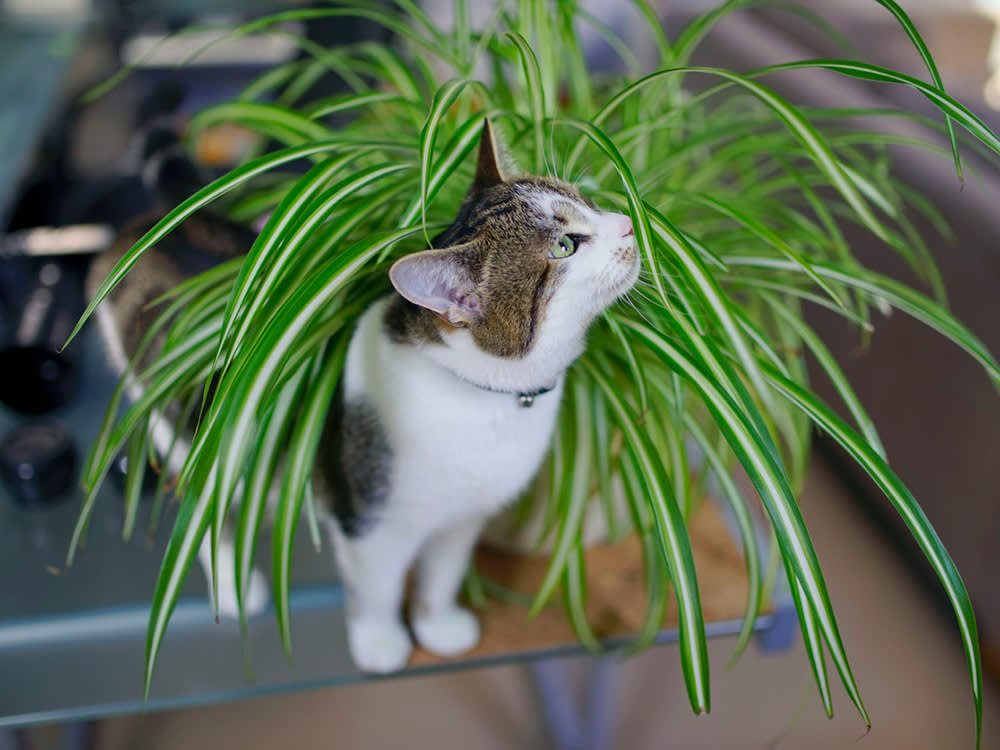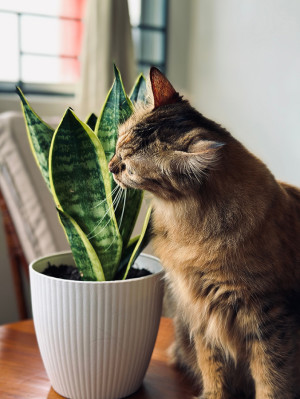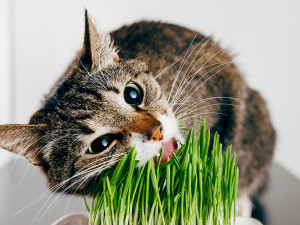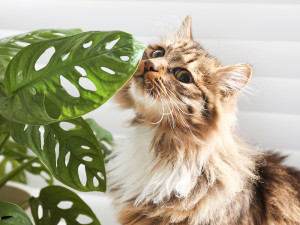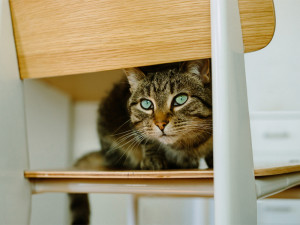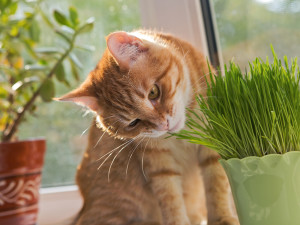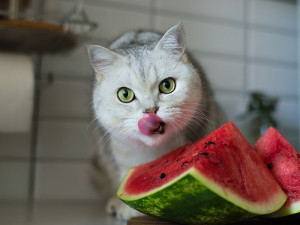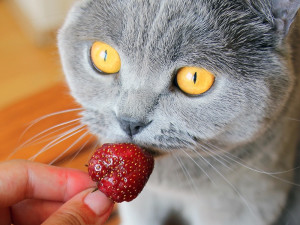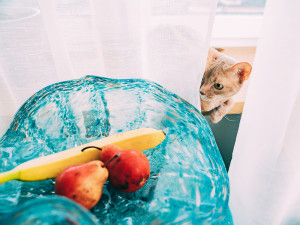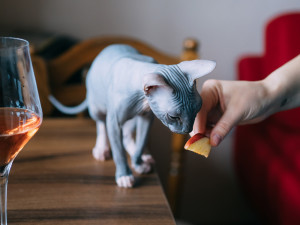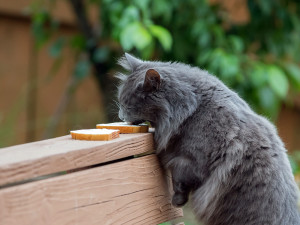Are Spider Plants Toxic to Cats?
Learn what you should do if your “spider babies” and cat baby interact.
Spider plants, also called ribbon plants or spider ivy, are popular indoor plants that have been shown to help improve indoor air qualityopens in new tab. During summer, spider plants produce small white flowers that eventually form new baby spider plantlets.
These plantlets are also called spider babies, spiderettes, or pups (my favorite nickname) depending on who you ask. So, can this cool plant safely live with your cool cat? Yes, it can — with some considerations.
Are spider plants dangerous to cats?
Spider plants (Chlorophytum comosum) are not toxic to cats. Spider plants are popular among plant parents because they are beginner-friendly, able to thrive in almost any environment, and easy to propagate. These spindly plants make great potted or hanging plants, and those long leaves can be tempting for any cats in the home. While spider plants are considered non-toxic, cats can still experience some mild gastrointestinal upset if they ingest enough of the plant.
What should I do if my cat has eaten a spider plant?
If you find tiny teeth marks in your spider plant or catch your kitty in the act, monitor your cat closely for nausea or gastrointestinal upset. If your cat pukes up a few leaves and seems completely normal afterward, medical treatment is probably not necessary. But if your cat is puking non-stop or having crazy diarrhea, then you should seek veterinary care ASAP.
Diagnosing plant ingestion in cats
The best way to determine if a cat ate a spider plant is to witness them in the act. Finding pieces of the plant’s thin green leaves in a cat’s vomit may also serve as a strong clue. If your cat has non-specific GI signs as well as access to houseplants, be sure to let your vet know.
Symptoms of plant ingestion in cats
Despite the spider plant’s non-toxic status, ingestion does not mean that a cat will not experience any ill effects. Some people believe that spider plants have a mild hallucinogenic effect on cats, but there is no research to back up this claim. While some cats can take a tiny taste of spider plant without any ill effect, some cats will experience gastrointestinal upset.
Symptoms of spider plant ingestion include:
Drooling
Vomiting
Diarrhea
Treatment for plant ingestion in cats
Cats who eat large amounts of spider plant can develop gastrointestinal symptoms that require symptomatic treatment. A single episode of vomiting can likely go without medical treatment. Cats with multiple episodes of vomiting may become dehydrated and require fluid therapy, anti-nausea medication, and/or treatment for diarrhea. If a cat really gorges themselves on a spider plant, the leaves could form a wad in their stomach that requires surgical removal.
How to prevent plant poisoning
Spider plants are non-toxic to cats and can typically be kept safely in a home with a cat. The nice thing about having spider plants is that your cat can hang around them without causing a major concern. If your cat can’t resist the temptation of the spider plant’s wispy leaves, the plant should be kept well out of reach of your cat to be safe. Be sure to look up the potential for toxicity to your cat before adding any new plants to your home.
Are all parts of spider plants poisonous to cats?
No part of the spider plant is considered poisonous to cats, but they can be irritating to a cat’s gastrointestinal tract if eaten. Plant fertilizer that is applied to a spider plant can make the plant, its soil, or any standing water toxic to cats.
How do I stop my cat from eating a spider plant?
To prevent your cat from eating a spider plant, keep the plant out of your cat’s reach. This may mean your spider plant lives on a high shelf or hangs from the ceiling where your cat can’t access it.
The bottom line: Are spider plants poisonous to my cat?
Spider plants are not poisonous to cats, but they can still cause mild gastrointestinal upset if a cat eats enough of it. While serious illness is not expected if your cat occasionally nibbles on a spider plant, cats should not be allowed to indulge.
Other plants that are safe for cats
Prayer Plant (Maranta leuconeura): These popular pet-friendly plants enjoy bright, indirect sunlight. Their leaves open with the morning sunlight and close again at dusk (pretty cool).
Watermelon Peperomia (Peperomia argyreia): Also known as a watermelon plant, the pattern on the leaves of this cat-safe house plant resembles the pattern on a watermelon rind.
Venus Fly Trap (Dionaea muscipula): Cat parents who want to build a collection of unusual, pet-safe plants will be glad to hear that a venus fly trap fits the bill. This carnivorous plant may spark a cat’s curiosity, and may even be triggered to close by a nose or whisker that gets too close.
Other plants that are dangerous for cats
Sago palm (Cycas revoluta): Although sago palm toxicity is more commonly seen in dogs, this ornamental plant is just as deadly to cats. Cats who ingest sago palm are at risk for developing severe gastrointestinal upset, liver failure, and neurological symptoms including seizures.
Dieffenbachia (Dieffenbachia sp.): These plants contain enzymes and calcium oxalates that are highly irritating to cats. Just chewing a Dieffenbachia can give a cat’s mouth a painful burning sensation. This irritation can progress to drooling, gagging, difficulty swallowing, and vomiting.
Rubber Tree Plant (Ficus benjamina): Other names include Indian rubber plant and Weeping fig. These plants can grow into nice indoor trees, but unfortunately they are not safe for cats. Ficus plants contain irritating sap that can cause oral irritation and gastrointestinal upset if ingested by a cat. The sap can also irritate a cat’s skin with direct contact. Your cat would be safer with a tree specifically designed for them.
FAQs (people also ask):
What happens if a cat eats a spider plant?
Some cats can eat small amounts of spider plant and not develop any symptoms. If enough spider plant is ingested, a cat may develop mild gastrointestinal symptoms like vomiting or diarrhea.
Can cats eat spider plants safely?
Cats are not expected to develop serious illness if they eat small amounts of spider plant. Although spider plants are non-toxic to cats, they can still cause gastrointestinal upset.
Are spider plants poisonous to cats if they smell them?
No part of a spider plant is considered to be toxic to cats and cats can safely smell them. A cat can hang out, play, and nap around spider plants without concern for toxicity.
